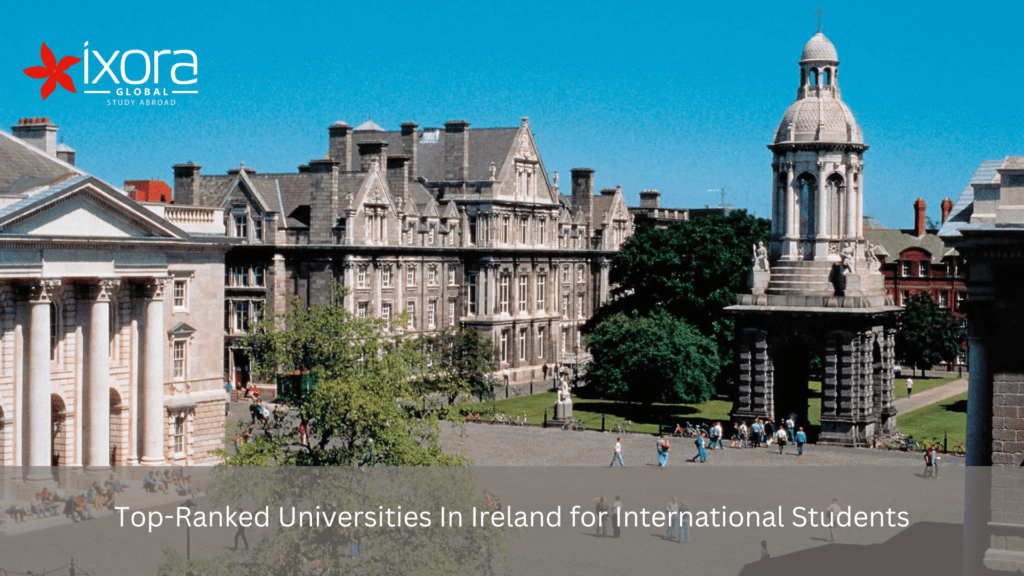Top-Ranked Universities In Ireland for International Students

Studying in Ireland offers a mix of excellent education, a vibrant culture, and practical benefits, making it an attractive destination for international students. With top-tier universities like Trinity College Dublin and University College Cork, Ireland provides a high-quality education system recognized worldwide. The country is home to a wide array of programs across disciplines, from tech to arts, and offers degrees at all levels. Living costs are relatively affordable, and most universities offer on-campus housing, plus reliable public transport keeps getting around easy.
English as the primary language of instruction removes language barriers for many, and Gaelic is available for those who want to learn a unique native language. Ireland’s strong economy and job market create excellent career opportunities in fields like technology and healthcare. Students can also work part-time while studying, thanks to flexible visa options. The welcoming atmosphere, safe environment, and active student communities make Ireland not just a place to study, but a place to feel at home. From bustling student clubs to career services and support systems, Ireland offers a well-rounded student life that’s hard to match.
Popular Universities In Ireland
- Technological University of Dublin (TU Dublin)
- Ireland’s first technological university, established in 2019.
- Specializes in STEM fields with over 28,000 students from 140+ nationalities.
- Five campuses: three in Dublin city, two in Blanchardstown and Tallaght.
- Maynooth University
- Autonomous since 1997, with roots dating back to 1795.
- Hosts over 15,000 students from 100+ countries.
- Strong international focus, offering diverse global programs and partnerships.
- University of Limerick (UL)
- Located on the scenic west coast along the River Shannon.
- Strong business ties give graduates a 15% higher employment rate than the national average.
- Known for Cooperative Education, placing 2,000+ students in paid work placements, 30% of which are international.
- Dublin City University (DCU)
- Founded in 1975, with five closely located campuses.
- Pioneered workplace internships in undergraduate courses to boost employability.
- Highly rated for sustainability, with a focus on building transferable skills.
- University of Galway
- Established in 1845, it now has over 18,000 students.
- Offers a wide array of courses, including part-time and online options.
- Graduates have a 96% employment or further study rate within six months of graduation.
- University College Cork (UCC)
- Founded in 1849, it now serves over 20,000 students.
- Highly ranked for sustainability, thanks to its student-led Green Campus Programme.
- Awarded a green flag from the Foundation for Environmental Education, maintained since 2020.
- University College Dublin (UCD)
- Educates 38,000+ students, including 10,000+ international students from 144 countries.
- Known for academic excellence and flexible, research-led learning.
- Ranks in the top 1% of universities globally.
- Trinity College Dublin (TCD)
- Founded in 1592, known for its academic reputation and historic legacy.
- Only Irish member of the League of European Research Universities.
- Notable alumni include Oscar Wilde, Samuel Beckett, and William Rowan Hamilton.
Best Courses To Study In Ireland
Ireland’s education system has adapted to global trends, becoming a top choice for international students in technology, healthcare, and other fields. Among the most in-demand courses is Business Analytics, which combines data analysis, business intelligence, and programming to drive strategic decisions. This field is highly sought after across industries like IT, finance, and telecom, with graduates earning an average salary of €54,302 in roles such as Business Analyst and Data Scientist.
Investment Banking and Finance is another key area, supported by the presence of global investment banks in Dublin, which fuels demand for roles in finance and compliance. Students in this field often secure competitive salaries in positions like Financial Analyst, Investment Banker, and Risk Specialist. Big Data and Data Science programs cover essential areas of data mining, programming, and analytics, equipping students to unlock business insights. Ireland’s thriving tech scene provides ample career opportunities in multinational corporations, with average salaries around €55,000 for roles like Data Scientist and Business Intelligence Analyst.
In the life sciences, Pharmaceutical Sciences is a high-demand field due to Ireland’s strong pharma industry, which offers roles in drug development and biochemical research. Graduates find opportunities with leading companies and earn average salaries of €52,000 in roles like Pharmacologist and Development Chemist. Meanwhile, Ireland’s rich literary heritage makes Creative Writing a popular choice, fostering careers in publishing, media, and content creation, with roles like Writer, Editor, and Content Strategist earning an average of €30,671.
Ireland also offers a range of Diploma Programs, providing practical, short-term training in fields like business, technology, healthcare, and the creative arts. These programs, accredited by the National Framework of Qualifications, span Levels 5 to 8 and typically last one to two years, making them ideal for career readiness or further academic pursuits.
Popular Scholarships To Study In Ireland
Studying in Ireland can be affordable if you plan ahead and apply for scholarships early. Irish universities, colleges, the government, and private organizations offer a variety of scholarships for international students. These financial aids can be partially or fully paid, depending on factors like academic merit, chosen course, and institution. Make sure to check each scholarship’s eligibility criteria and deadlines carefully before applying.
For Indian students, the primary requirement for most scholarships is strong academic performance, though factors like extracurricular achievements and volunteer work can also help. Some scholarships may require only an application, while others might have additional requirements, such as written assignments for research programs. If you’re unsure about anything, don’t hesitate to reach out to the university’s admissions office for guidance.
Scholarship amounts vary widely. Some research programs may cover up to 100% of tuition and a portion of living expenses. Government scholarships tend to be more competitive than university scholarships, so it’s best to start the application process 8-12 months before your preferred intake.
These are the scholarships available for studying in Ireland:
- Government of Ireland International Education Scholarship
This scholarship awards 60 international students for one year of study at the bachelor’s, master’s, or PhD level in an Irish higher education institution. Recipients receive a €10,000 stipend for the year, along with fully funded tuition and other registration fees.
- The Walsh Fellowship
This fellowship supports postgraduate students working on research projects within Teagasc’s areas of focus, such as food, agriculture, environment, and rural development, in honor of Dr. Tom Walsh. Each year, up to 30 students receive €22,000 annually. The fellowship typically lasts two years for MSc programs and up to four years for PhDs. Applications open in June, with a deadline in early September. Note that this fellowship is only for research-focused programs and does not apply to taught postgrad courses.
- Government of Ireland Postgraduate Scholarship 2024
Funded by the Department of Education and Skills, this scholarship is for international students pursuing research-based master’s and PhD programs, including direct PhD paths. Recipients are awarded a stipend of €18,500 per year, a contribution to tuition fees (up to €5,750 annually), and an allowance of €3,250 per year for research expenses.
Top-Ranked Universities In Ireland for International Students Read More »






